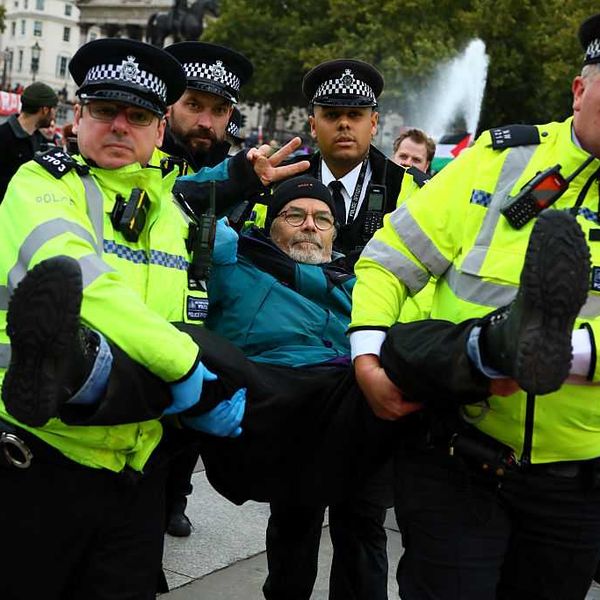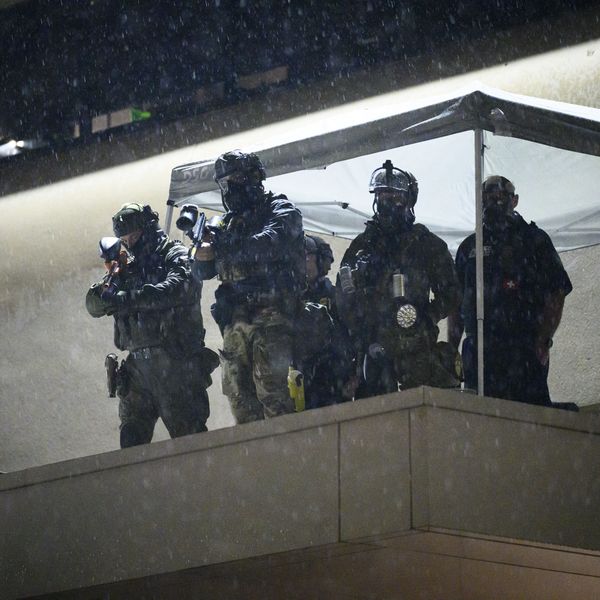Britain's government has introduced sweeping changes to the country's welfare, justice, health and tax systems, including a "bedroom tax" that will reduce housing subsidies that primarily benefit poor people. The levy ostensibly aims to "tackle overcrowding and encourage a more efficient use of social housing," resulting in an estimated million "social housing" households losing 14-25 percent of their housing benefits.
The Guardian:
Critics say it is an inefficient policy as in the north of England, families with a spare rooms outnumber overcrowded families by three to one, so thousands will be hit with the tax when there is no local need for them to move. Two-thirds of the people hit by the bedroom tax are disabled.
Thousands of trade unions, advocates for the disabled, leading churches, and anti-poverty protesters held marches against the changes over the weekend, calling the cuts "unjust." In a joint report released over the weekend, the Baptist Union of Great Britain, the Methodist Church, the United Reformed Church and the Church of Scotland criticized the government of perpetuating myths about poverty in an attempt to justify the cuts.
The Methodist Church's public policy adviser, Paul Morrison, told the BBC the cuts suggest people in poverty "deserve" the situation they are in.
"Our feeling is that these benefit changes are a symptom of an understanding of people in poverty in the United Kingdom that is just wrong," he added.
Keeping with the theme of penalizing poverty, and as Morrison states, making it seem as though poor people "deserve" their plight, the government refers to the bedroom tax as an "under-occupancy penalty," again placing the onus on the poor.
The cuts have already resulted in some seriously warped means testing. The AP reports parents whose children are not considered "disabled enough" by local officials have been told they must pay. A particularly heartbreaking testimony came from a bereaved couple who couldn't bear to change the bedroom of their 7-year-old daughter after she died of brain cancer. Under the cuts, they'd essentially be forced to pay a fee for their grief.
Opponents point out the government hasn't considered other options, like taxing mansions or second homes rather than coming after the poor yet again.
Frank Field, a minister in the previous Labour administration and now a government adviser on fighting poverty, told The Guardian that "the government is introducing social and physical engineering that Stalin would have been proud of."
Finance minister George Osborne and Work and Pensions Secretary Iain Duncan Smith on Monday have labelled opponents of their plan as "shrill."
Al-Jazeera:
"Of course, if you listened to the shrill voices of the Left you'd think that every change to the welfare system, and any attempt to save money, marks the beginning of the end of the world," Osborne and Duncan Smith wrote in an article published in Britain's Telegraph newspaper.
...
The new welfare measures include increasing benefit payments by just one percent for the next three years, well below the rate of inflation of 2.8 percent, a move Osborne and Duncan Smith said would save taxpayers $3bn a year.
In total, nearly ten million households will be hit by the Tory-led coalition's brutal cuts, leaving UK families PS891 ($1355) a year worse off. Other changes include the slashing of help with Council Tax bills and cuts to welfare benefits.
Daily Mirror:
Leslie Morphy, chief executive of homeless charity Crisis, said: "Our poorest households face a bleak April as they struggle to budget for all these cuts coming at once.
"People are already cutting back on the essentials of food and heating. The result will be misery--cold rooms, longer queues at food banks, broken families, missed rent payments and yet more people facing homelessness."
Charities warn that up to 600,000 more children could sink into poverty by 2015 due to the cuts. (It's estimated that three million children already live in poverty in the UK).
Alison Worsley from Barnado's, a children's charity, said, "By breaking the link between benefits and inflation, MPs are condemning children in Britain's poorest families to growing up stuck in the poverty, placing them at greater risk of chronic childhood illness, slipping behind at school and being unemployed in the future."
"These alarming figures reveal that not only are the poorest families in the country being left behind compared to everyone else, but also that their living standards are going into reverse as they struggle to absorb the impact of wave after wave of policy decisions that hit families with children the hardest," said Barnado's Imran Hussain.
The government will now measure which citizens qualify as disabled using much harsher standards, and according to research done by Scope, a disabled charity, and think tank Demos, up to 5,000 people with disabilities will lose PS23,000 ($34,932) each over the next five years. Meanwhile, another 26,000 people will no longer qualify as disabled.
The Mirror reports an estimated 3.7 million disabled people will lose a total of PS28 billion ($42.6 billion) by 2018 because of the changes.
More than 50 social policy professors signed a letter urging the government to reconsider the cuts, citing that the harsh austerity measures will result in the poorest tenth of households losing the equivalent of 38 percent of their income.
The professors say the changes will undermine public support for the welfare state which they call, "one of the hallmarks of a civilised society," and "welfare states depend on a fair collection and redistribution of resources, which in turn rests upon the maintenance of trust between different sections of society and across generations."
A separate report submitted by academics from six UK universities concluded that Britain's poorest are worse off today they they were at the height of cuts imposed by Margaret Thatcher's Conservative government in 1983.
The Guardian:
The Poverty and Exclusion project reports that 33% of British households lacked at least three basic living necessities in 2012, compared with 14% in 1983. These include living in adequately heated homes, eating healthily, and owning basic clothing items such as properly fitting shoes.
"Despite the fact that the UK is a much wealthier country, levels of deprivation are going back to the levels found 30 years ago," says the report, titled The Impoverishment of The UK.

